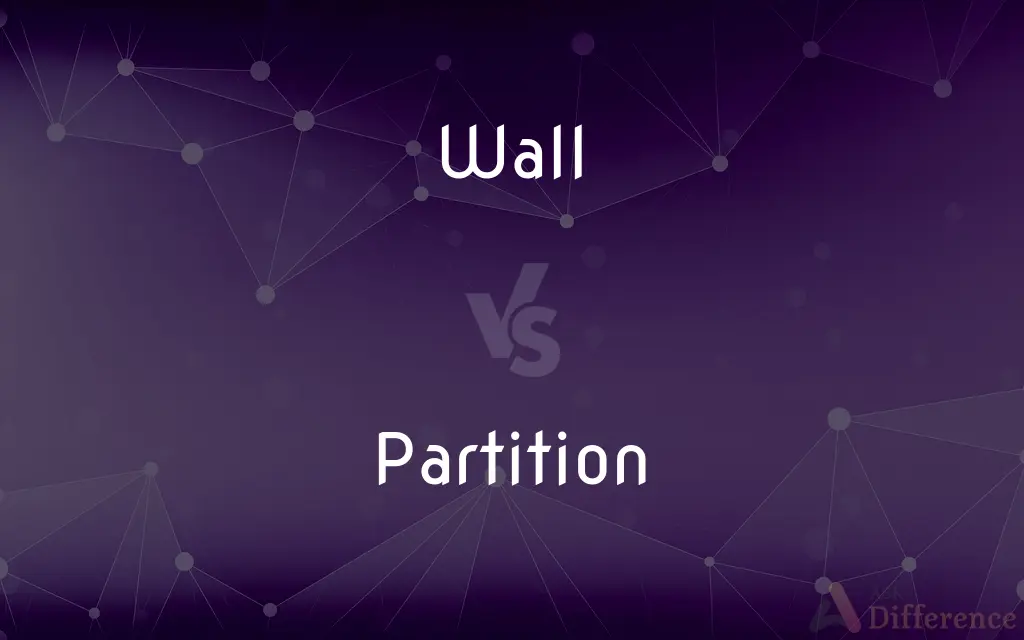Wall vs. Partition — What's the Difference?
By Maham Liaqat & Urooj Arif — Updated on April 2, 2024
A wall is a permanent structure defining space, while a partition is often temporary, dividing rooms flexibly.

Difference Between Wall and Partition
Table of Contents
ADVERTISEMENT
Key Differences
Walls are integral parts of a building's structure, providing support and defining the perimeter or external boundaries. They are usually constructed from durable materials like brick, stone, or concrete, ensuring stability and security. On the other hand, partitions are interior divisions that are lighter, less permanent, and often used to organize space within a building. Made from materials such as wood, glass, or drywall, partitions can be fixed or movable. They offer flexibility in layout design, allowing spaces to be customized according to changing needs without major renovations.
Walls not only define the physical space but also contribute to the building's insulation, privacy, and protection against elements. They are typically designed to last the lifetime of a building and are not meant to be moved or altered without significant effort. Partitions are especially useful in office settings where the need for different room sizes and functions can change over time.
While walls are a fundamental aspect of a building's architecture and structural integrity, partitions serve more functional and aesthetic purposes. Walls are essential for the overall stability of a building, bearing loads, and providing resistance against wind and seismic activities. They require careful planning and construction, often involving regulatory approval due to their impact on safety and building integrity. Partitions, however, are primarily non-load bearing and do not significantly affect the building's structural integrity. They can be installed, reconfigured, or removed with relatively minimal impact, making them ideal for temporary layouts or when needing to adapt spaces for various uses. This flexibility makes partitions a popular choice in dynamic environments such as offices, exhibition centers, and residential apartments seeking to maximize functionality.
Despite their differences, both walls and partitions play crucial roles in the design and functionality of spaces. Walls offer a permanent solution to space definition, exterior protection, and structural support. In contrast, partitions provide an adaptable and often cost-effective way to meet changing interior space requirements without the need for extensive construction work.
Comparison Chart
Nature
Permanent
Temporary or semi-permanent
ADVERTISEMENT
Function
Structural support, defines building perimeter
Divides space within buildings
Material
Brick, stone, concrete
Wood, glass, drywall, metal
Flexibility
Fixed, not easily moved or altered
Movable, adjustable
Impact
Integral to building structure and exterior
Interior layout and design without affecting structure
Compare with Definitions
Wall
The side of a room or building forming a continuous vertical area.
We painted the walls a light blue.
Partition
A means of separating spaces without constructing walls.
Partitions offer a flexible way to organize open-plan offices.
Wall
A barrier or boundary.
The wall between the two properties was overgrown with ivy.
Partition
A structure dividing a space for specific uses.
We added a partition to create a new conference room.
Wall
A structure that provides privacy or security.
A privacy wall was built around the patio.
Partition
A temporary fixture that can be moved or adjusted.
The exhibition used partitions to create individual display areas.
Wall
An obstacle or barrier in emotional or psychological terms.
He has built a wall around himself since the accident.
Partition
An interior division that does not bear load.
The partition can be easily removed if we need more space.
Wall
A solid structure that defines and sometimes protects an area.
The ancient city walls still stand proudly.
Partition
A divider between parts of a room or space.
The office was divided into cubicles by partitions.
Wall
A wall is a structure and a surface that defines an area; carries a load; provides security, shelter, or soundproofing; or, is decorative.
Partition
The act or process of dividing something into parts.
Wall
An upright structure of masonry, wood, plaster, or other building material serving to enclose, divide, or protect an area, especially a vertical construction forming an inner partition or exterior siding of a building.
Partition
The state of being so divided.
Wall
Often walls A continuous structure of masonry or other material forming a rampart and built for defensive purposes.
Partition
Something that divides or separates, as a lightweight wall dividing one room or cubicle from another.
Wall
A structure of stonework, concrete, or other material built to retain a flow of water.
Partition
A wall, septum, or other separating membrane in an organism.
Wall
Something resembling a wall in appearance, function, or construction, as the exterior surface of a body organ or part
The abdominal wall.
Partition
A part or section into which something has been divided.
Wall
Something resembling a wall in impenetrability or strength
A wall of silence.
A wall of fog.
Partition
Division of a country into separate, autonomous nations.
Wall
An extreme or desperate condition or position, such as defeat or ruin
Driven to the wall by poverty.
Partition
An expression of a positive integer as a sum of positive integers.
Wall
(Sports) The vertical surface of an ocean wave in surfing.
Partition
The decomposition of a set into a family of disjoint sets.
Wall
To enclose, surround, or fortify with or as if with a wall
Wall up an old window.
Partition
(Computers) A section of storage space on a hard disk.
Wall
To divide or separate with or as if with a wall. Often used with off
Wall off half a room.
Partition
(Law) Division of property, especially real property, between co-owners into equivalent, separately owned portions or shares.
Wall
To confine or seal behind a wall; immure
"I determined to wall [the body] up in the cellar" (Edgar Allan Poe).
Partition
To divide into parts, pieces, or sections.
Wall
To block or close (an opening or passage, for example) with or as if with a wall.
Partition
To divide or separate by means of a partition
We partitioned off the alcove to make another bedroom.
Wall
A rampart of earth, stones etc. built up for defensive purposes.
Partition
To divide (a country) into separate, autonomous nations.
Wall
A structure built for defense surrounding a city, castle etc.
The town wall was surrounded by a moat.
Partition
An action which divides a thing into parts, or separates one thing from another.
Wall
Each of the substantial structures acting either as the exterior of or divisions within a structure.
We're adding another wall in this room during the remodeling.
The wind blew against the walls of the tent.
Partition
A part of something that has been divided.
Wall
A point of desperation.
Partition
(math) An approach to division in which one asks what the size of each part is, rather than (as in quotition) how many parts there are.
Wall
A point of defeat or extinction.
Partition
The division of a territory into two or more autonomous ones.
Monarchies where partition isn't prohibited risk weakening through parcellation and civil wars between the heirs.
Wall
An impediment to free movement.
A wall of police officers met the protesters before they reached the capitol steps.
Partition
A vertical structure that divides a room.
A brick partition; lath and plaster partitions
Wall
The butterfly Lasiommata megera.
Partition
That which divides or separates; that by which different things, or distinct parts of the same thing, are separated; boundary; dividing line or space.
Wall
A barrier.
A seawall;
A firewall
Partition
A part divided off by walls; an apartment; a compartment.
Wall
A barrier to vision.
Partition
(legal) The severance of common or undivided interests, particularly in real estate. It may be effected by consent of parties, or by compulsion of law.
Wall
Something with the apparent solidity and dimensions of a building wall.
A wall of sound;
A wall of water
Partition
(computing) A section of a hard disk separately formatted.
Wall
A divisive or containing structure in an organ or cavity.
Partition
(databases) A division of a database or one of its constituting elements such as tables into separate independent parts.
Wall
(auction) A fictional bidder used to increase the price at an auction.
Partition
(set theory) A collection of non-empty, disjoint subsets of a set whose union is the set itself (i.e. all elements of the set are contained in exactly one of the subsets).
Wall
A doctor who tries to admit as few patients as possible.
Partition
(music) A musical score.
Wall
(soccer) A line of defenders set up between an opposing free-kick taker and the goal.
Partition
To divide something into parts, sections or shares.
To partition a hard drive
Wall
(roller derby) Two or more blockers skating together so as to impede the opposing team.
Partition
To divide a region or country into two or more territories with separate political status.
Poland was progressively partitioned by Russia, Austria, and Prussia in the late 18th century.
Wall
(mining) Any of the surfaces of rock enclosing the lode.
Partition
To separate or divide a room by a partition (ex. a wall), often use with off.
Wall
(Internet) A personal notice board listing messages of interest to a particular user.
Partition
The act of parting or dividing; the state of being parted; separation; division; distribution; as, the partition of a kingdom.
And good from bad find no partition.
Wall
(role playing games) A character that has high defenses, thereby reducing the amount of damage taken from the opponent’s attacks.
Partition
That which divides or separates; that by which different things, or distinct parts of the same thing, are separated; separating boundary; dividing line or space; specifically, an interior wall dividing one part or apartment of a house, a compartment of a room, an inclosure, or the like, from another; as, a brick partition; lath and plaster partitions; cubicles with four-foot high partitions.
No sight could passBetwixt the nice partitions of the grass.
Wall
The stage of biological aging where physical appearance and attractiveness start to deteriorate rapidly.
Partition
A part divided off by walls; an apartment; a compartment.
Wall
(historical) The right or privilege of taking the side of the road near the wall when encountering another pedestrian.
Partition
The severance of common or undivided interests, particularly in real estate. It may be effected by consent of parties, or by compulsion of law.
Wall
(cycling) A very steep slope.
Partition
A score.
Wall
A spring of water.
Partition
To divide into parts or shares; to divide and distribute; as, to partition an estate among various heirs.
Wall
(nautical) A kind of knot often used at the end of a rope; a wall knot or wale.
Partition
To divide into distinct parts by lines, walls, etc.; as, to partition a house.
Uniform without, though severally partitioned within.
Wall
To enclose with, or as if with, a wall or walls.
He walled the study with books.
Partition
A vertical structure that divides or separates (as a wall divides one room from another)
Wall
To boil.
Partition
The act of dividing or partitioning; separation by the creation of a boundary that divides or keeps apart
Wall
To well, as water; spring.
Partition
(computer science) the part of a hard disk that is dedicated to a particular operating system or application and accessed as a single unit
Wall
To make a wall knot on the end of (a rope).
Partition
Divide into parts, pieces, or sections;
The Arab peninsula was partitioned by the British
Wall
A kind of knot often used at the end of a rope; a wall knot; a wale.
Partition
Separate or apportion into sections;
Partition a room off
Wall
A work or structure of stone, brick, or other materials, raised to some height, and intended for defense or security, solid and permanent inclosing fence, as around a field, a park, a town, etc., also, one of the upright inclosing parts of a building or a room.
The plaster of the wall of the King's palace.
Wall
A defense; a rampart; a means of protection; in the plural, fortifications, in general; works for defense.
The waters were a wall unto them on their right hand, and on their left.
In such a night,Troilus, methinks, mounted the Troyan walls.
To rush undaunted to defend the walls.
Wall
An inclosing part of a receptacle or vessel; as, the walls of a steam-engine cylinder.
Wall
The side of a level or drift.
Wall
To inclose with a wall, or as with a wall.
The king of Thebes, Amphion,That with his singing walled that city.
Wall
To defend by walls, or as if by walls; to fortify.
The terror of his name that walls us in.
Wall
To close or fill with a wall, as a doorway.
Wall
An architectural partition with a height and length greater than its thickness; used to divide or enclose an area or to support another structure;
The south wall had a small window
The walls were covered with pictures
Wall
An embankment built around a space for defensive purposes;
They stormed the ramparts of the city
They blew the trumpet and the walls came tumbling down
Wall
Anything that suggests a wall in structure or function or effect;
A wall of water
A wall of smoke
A wall of prejudice
Negotiations ran into a brick wall
Wall
A masonry fence (as around an estate or garden);
The wall followed the road
He ducked behind the garden wall and waited
Wall
(anatomy) a layer (a lining or membrane) that encloses a structure;
Stomach walls
Wall
A vertical (or almost vertical) smooth rock face (as of a cave or mountain)
Wall
A layer of material that encloses space;
The walls of the cylinder were perforated
The container's walls were blue
Wall
A difficult or awkward situation;
His back was to the wall
Competition was pushing them to the wall
Wall
Surround with a wall in order to fortify
Common Curiosities
Is it possible to convert a partition into a wall?
While partitions can be made more permanent, converting them into structural walls requires significant alterations to meet building codes and structural requirements.
What is the main difference between a wall and a partition?
A wall is a permanent, load-bearing structure, while a partition is a more flexible, often non-load-bearing divider within a space.
Are partitions less durable than walls?
Generally, yes, because partitions are usually made from lighter materials and designed for flexibility rather than long-term durability.
Do walls always have a foundation?
Yes, walls typically have foundations, especially if they are exterior or load-bearing, to ensure stability and support.
Can partitions offer sound insulation?
Yes, certain types of partitions are designed to provide sound insulation, improving privacy and reducing noise transfer.
Can partitions be used as exterior walls?
No, partitions are designed for interior use and do not provide the structural support or weather protection required for exterior walls.
How are partitions installed?
Partitions are installed based on their design, ranging from simple, freestanding panels to more complex systems that may require assembly and anchoring.
Can a partition be made from glass?
Yes, glass partitions are popular in modern office designs for creating bright, open spaces while maintaining separate areas.
What materials are commonly used for partitions?
Wood, glass, metal, and drywall are common materials for partitions, chosen for their versatility and ease of installation.
Can walls be removed to create an open space?
Yes, but removing load-bearing walls requires structural modifications and usually professional consultation to ensure safety.
Do partitions need building permits?
This varies by location, but partitions often require fewer or no permits compared to walls, especially if they are not permanent.
Are all walls load-bearing?
Not all walls are load-bearing; some interior walls are primarily for dividing spaces and may not support any weight from above.
What are the environmental considerations for choosing walls or partitions?
Material choice, energy efficiency, and the potential for reuse or recycling are key environmental considerations for both walls and partitions.
How do walls contribute to a building's insulation?
Walls often contain insulation materials within their structure, helping to control temperature and reduce energy costs.
Why might someone choose a partition over a wall?
For flexibility in layout, ease of installation, and the ability to change the space without major construction.
Share Your Discovery

Previous Comparison
Update vs. Upload
Next Comparison
Digoxin vs. DigitoxinAuthor Spotlight
Written by
Maham LiaqatCo-written by
Urooj ArifUrooj is a skilled content writer at Ask Difference, known for her exceptional ability to simplify complex topics into engaging and informative content. With a passion for research and a flair for clear, concise writing, she consistently delivers articles that resonate with our diverse audience.
















































